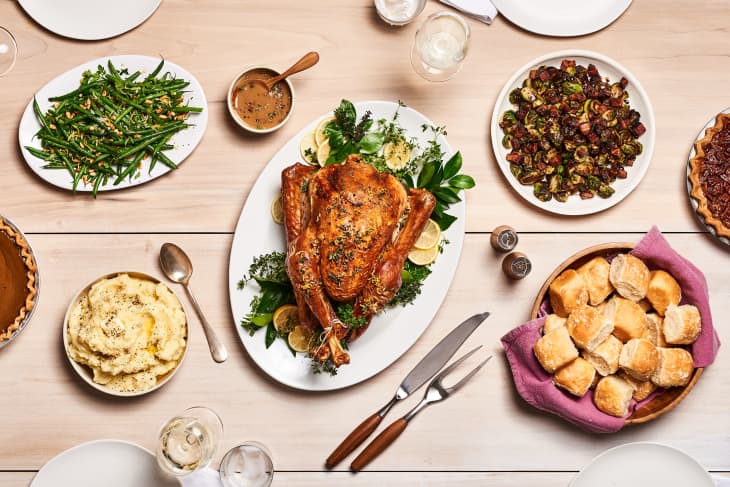Never Feed These 5 Thanksgiving Foods to Your Pets

While Thanksgiving is going to look a little different for many people this year, one thing that will likely stay the same is the array of delicious, festive foods. One tradition to keep up now and forever? Limiting, and maybe even keeping your pets entirely away from, the special “human foods” that adorn many tables.
It might seem second nature to allow your pets to indulge, and with good reason. (They’re part of your family, too!) “A few small boneless pieces of cooked turkey, a taste of mashed potato or even a lick of pumpkin pie shouldn’t pose a problem” to some pets, Tina Wismer, DVM, the Senior Director at the ASPCA Animal Poison Control Center, tells Apartment Therapy. However, there are some Thanksgiving treats you never want to share with your pets. That goes double for overindulgence: Dr. Wismer says that allowing pets to chow down on too many treats could lead to major discomfort.
“They could wind up with a case of stomach upset, diarrhea or even worse—an inflammatory condition of the pancreas known as pancreatitis,” she warns.
There’s another reason why you should keep your pets away from your Thanksgiving table: As a result of COVID-19 protocols, many veterinary clinics across the country are staggering their bookings, and may not be able to see your pet as easily as they would in prior years. The American Animal Hospital Association (AAHA) reports that delays have created a ripple effect and that veterinary emergency clinics are seeing record numbers of cases regarding minor injuries and ailments.
Prevention is the best way to avoid navigating such a backlog, but if you suspect your pet has eaten any potentially toxic foods, make a note of the amount ingested and contact your veterinarian or the ASPCA Animal Poison Control Center at (888) 426-4435.
As you prepare for your Thanksgiving feast, here are the top foods to avoid sharing with your pets.
Raw turkey and turkey bones
Just like us, dogs and cats can get sick from raw or undercooked meat. Dr. Wismer cautions that it’s important to avoid letting your pet consume any raw turkey because it may contain salmonella bacteria. Salmonella can make your dog or cat sick, but it’s even more likely to make them carriers for the bacteria and spread it to people in your home.
You also want to keep turkey bones or carcass away from your pets because they splinter easily. These shards are often sharp and can lead to punctures in your pet’s stomach or intestines, or develop into gastrointestinal blockages. If you do want to share a small bite or two of turkey with your dog or cat, Dr. Wismer encourages you to make sure that the meat is fully cooked and hasn’t been seasoned, as the spices frequently used for basting are often toxic for dogs and cats.
Stuffing (and especially well-seasoned dressing)
This favorite side dish can be deceptively dangerous. The big problem isn’t actually the bread or rice that makes up the stuffing, but rather the flavoring and herbs that play a prominent role in your favorite recipe. “Sage can be a delicious addition to your Thanksgiving stuffing, it (and many other herbs) contain essential oils and resins that can cause gastrointestinal upset and central nervous system depression in pets, especially cats,” Dr. Wismer warns. Stuffing also usually contains onions and/or garlic, which are toxic to both cats and dogs. “Small amounts could cause stomach upset, while large amounts could cause anemia,” cautions Dr. Wismer.
Pie of all kinds
Desserts and other holiday sweet treats can have hidden dangers for dogs and cats and should all be kept out of paws’ reach. “Desserts can contain artificial sweeteners, like xylitol, that can cause low blood sugar and liver damage in dogs,” Dr. Wismer says. If your favorite Thanksgiving dessert involves dark chocolate, you want to be extra vigilant—all chocolate is toxic to dogs, but the darker varieties especially so. “Chocolate contains substances called methylxanthines that can cause vomiting and diarrhea, panting, excessive thirst and urination, hyperactivity, abnormal heart rhythm, tremors, seizures and even death,” notes Dr. Wismer.
Nuts like pecans have aflatoxin in them which lead to liver damage in dogs, so you definitely don’t want to share a slice of grandma’s pecan pie—not that you were going to be generous with your bites anyway.
Bread dough
Making fresh bread for Thanksgiving? Be sure to keep the dough away from your pets! Plain bread doesn’t seem like it would be dangerous, but “when a dog or cat ingests raw bread dough, the yeast continues to convert the sugars in the dough to carbon dioxide gas and alcohol. This can result in bloated, drunken pets, which could become a life-threatening emergency, requiring hospitalization,” advised Dr. Wismer.
Alcohol
With a year like 2020 you might find yourself wanting a festive drink, but don’t toast with your pets! Even small amounts of alcohol can have serious consequences, and lead to your pet vomiting or becoming disoriented, experiencing tremors or seizures, and in severe instances can lead to organ failure or even be fatal.
This post originally ran on Apartment Therapy. See it there: 5 Thanksgiving Foods You Should Never Feed Your Pets